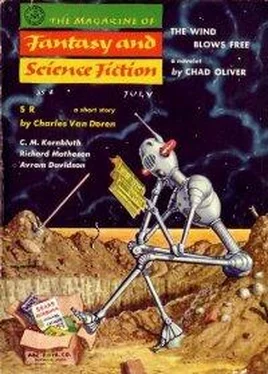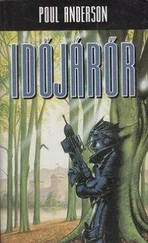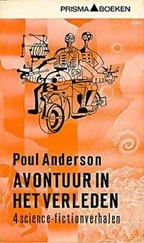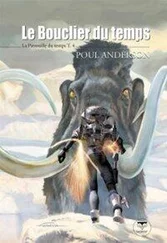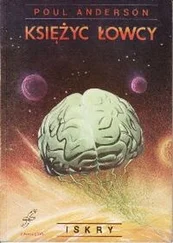“Why not? There are races on Earth and Mars with similar beliefs. To this day, here and there in my own Pyrenees, many women believe the wind can make them pregnant.” Navarro laughed. “It is a good excuse anyhow, no?”
“But there’s Dayside life too. Life that never comes into Twilight.”
“Yes, yes, of course. Quite different from Twilight biology—after all, it has to live at a temperature of four hundred degrees Centigrade. Possibly the Twonks regard some Dayside animal as a sort of fertility totem. I am only saying this—that if the gods are actually the sun, you will have Satan’s own time persuading the sun to take back its edict that we must die.”
In the end, there was a decision. Navarro thought Kings-bury a suicidal idiot… but what choice was there? They would go to the temple together, disguised, and find out what they could; if there were no gods, but only some fanatically conservative priestess behind the death sentence, a .20-caliber Magnum automatic might make her see reason. Antella would stay behind to guard the ship; he couldn’t take heat as well as an Earthling.
The humans donned their spacesuits and went through the air lock. Navarro had the gun, Kingsbury armed himself with a crowbar; at last and worst, he thought savagely, he’d crack a few Mercurian carapaces.
They stepped out into desolation. Behind them lay the Explorer , a crippled metal giant, no more to them than a shelter. In the end, perhaps, a coffin. There was no possibility of rescue from Earth—radio communication was out, with the sun so close, and Mercury Expedition Two wasn’t due back for six months. Earth wouldn’t even realize they were in trouble till they had already died.
To right and left, the dry valley lifted into gaunt ocherous peaks against a dusky sky where a few hard stars glittered. There were bushes scattered about, low things with blue metallic-looking leaves. A small animal bounded from them, its shell agleam in the wan light. The ground was slaty rubble, flaked off in departed ages when Mercury still had weather. Above the peaks to the left hung a white glare, the invisible sun. It would never be seen from here, but a few miles further west the planet’s libration would lift it briefly and unendurably over the near horizon.
There was a wind blowing; the wind is never quiet on Mercury, where one side is hot enough to melt lead and the other close to absolute zero. It sent a ghostly whirl of dust devils across the valley. There wasn’t much air—a man would have called it a soft vacuum and not fit to breathe at any density. Most of it had long ago escaped into space or frozen on Darkside, but now vapor pressure had struck a balance, and there was some carbon dioxide, nitrogen, ammonia, and inert gas free. Enough to blow fine dust up against the weak gravity and to form an ionosphere which made radio communication possible over the horizon.
Kingsbury shuddered, remembering green forests and clear streams under the lordly sky of Earth. What the devil had inspired him to come here? Money, he supposed. Earth needed fissionable ores, and Mercury had them, and Expedition Two was sent to negotiate an agreement with the natives. The pay was proportional to the risk—but what use is all the money in the cosmos to a dead man?
“When I get home,” said Navarro wistfully, “after the parades and banquets—yes, surely there will be parades, with all the pretty girls throwing flowers and kisses at us—after that I shall retire to my own village and sit down before the tavern and order a bottle of the best Amontillado. Three days later I will ask them to sweep the cobwebs off me. A week later I shall go home and sleep.”
“I’ll settle for a tall cold beer in Gavagan’s,” said Kingsbury. “You ought to let me take you pub crawling in New York sometime—bah!” His gauntleted hand made a vicious gesture at the tumbled ruin of a landscape. “What makes you think we ever will get home?”
“Nothing,” said Navarro gently, “except that I will not permit myself to think otherwise.”
They rounded a tall red crag and saw how the valley broadened into cultivated fields, ironberry bushes and flintgrain stalks. On the dusky edge of vision was the Mercurian hive, a giant dome of crushed rock in which several thousand natives dwelt There were hundreds of such barracks, scattered around the Twilight Zone, with a temple for every dozen or so. Apparently there was no variation in language or culture over the whole planet—understandable when the habitable area was so small. And it was an open question how much individual personality a Mercurian had, and how much of her belonged to the hive-mind.
Close at hand was the hut which held their lives. It was a crude, roofless structure, four stone walls and an open, doorway. The first expedition had erected it with native help, to store supplies and tools—it made the ship roomier. The Explorer’s crew had used it similarly, putting in most of their food and the bulky ion-control rings from the reaction drive. Again the natives had lent a willing hand.
There were four guards outside the hut. They were armed only with spears and clubs. It would be easy enough to shoot them down. But before anything could be transferred back to the ship, the entire hive would come swarming, and there weren’t that many bullets.
“Let’s go talk to them,” said Navarro.
“What’s the use?” asked Kingsbury. “I’ve talked to those animated hulks till my larynx needs a retread.”
“I have an idea—I want to check on it.” Navarro’s clumsy suit went skimming over the ashen ground. Kingsbury followed with a mumbled oath.
The nearest guard hefted her spear and swiveled antennae in their direction. Otherwise there was no movement in her. She stood six feet tall, broad as a space-suited man, her exoskeleton shimmering blue, her head featureless except for the glassy eyes. With four three-fingered arms, tightly curled ovipositor, and sliding joints of armor, she looked like a nightmare insect. But she wasn’t; a dragonfly or a beetle was man’s brother beside this creature of silicone cells and silicate blood and shell of beryllium alloy. Kingsbury thought of her as a kind of robot—well, yes, she was alive, but where did you draw the line between the robot and the animal?
Navarro stopped before her. She waited. None of her sisters moved. It was a disconcerting habit, never to open conversation.
The Basque cleared his throat. “I have come—oh, wait.” With his teeth he switched his helmet radio to the band the natives could sense. “I wish to ask again why you deny us permission to use our own food.”
The answer crackled in their earphones. “It is the command of the gods.”
Kingsbury stood listening to that nonhuman accent and speculating just what sort of religion these entities did have. They had emotions—they must, being alive—but the degree of correspondence to human or Martian feeling was doubtful.
It wasn’t strange that they communicated by organically generated FM radio pulses. The atmosphere didn’t carry enough sound to make ears worthwhile. But constant submergence in the thoughts of every other Mercurian within ten miles… it must do something to the personality. Make the society as a whole more intelligent, perhaps—the natives had readily learned English from the first expedition, while men hadn’t yet made sense out of the native language. But there was probably little individual awareness. A sort of ant mind—ants collectively did remarkable things but were hopeless when alone.
Navarro smiled, a meaningless automatic grimace behind his face plate. “Can you not tell my why the gods have so decreed? You were all friendly enough when my race last visited you. What made the gods change their minds?”
Читать дальше
